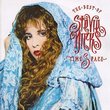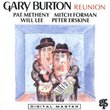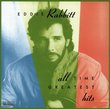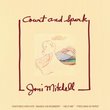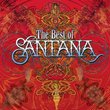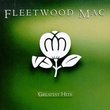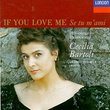| All Artists: Herbie Hancock Title: Essential Herbie Hancock Members Wishing: 3 Total Copies: 0 Label: Sony Original Release Date: 1/1/2006 Re-Release Date: 2/28/2006 Album Type: Original recording remastered Genres: Jazz, Pop, R&B, Rock Styles: Jazz Fusion, Modern Postbebop, Smooth Jazz, Soul-Jazz & Boogaloo, Bebop, Funk, Soul Number of Discs: 2 SwapaCD Credits: 2 UPC: 827969459324 |
Search - Herbie Hancock :: Essential Herbie Hancock
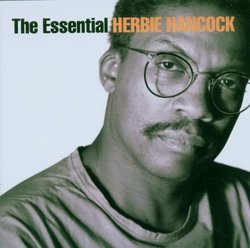 | Herbie Hancock Essential Herbie Hancock Genres: Jazz, Pop, R&B, Rock
This 2-CD, 21-track compilation shows how keyboardist/composer/bandleader Herbie Hancock successfully crossed the boundaries of jazz and pop for four decades. Compiled from five record labels, from 1962 to 2000, tracks lik... more » |
Larger Image |
CD DetailsSynopsis
Amazon.com This 2-CD, 21-track compilation shows how keyboardist/composer/bandleader Herbie Hancock successfully crossed the boundaries of jazz and pop for four decades. Compiled from five record labels, from 1962 to 2000, tracks like "Circle" showcase his legendary stint in Miles Davis' mid-'60s acoustic combos, and "Maiden Voyage," and "Cantaloupe Island" are but two of his historic jazz compositions from his Blue Note period. But hits like his smash soul-fusion, 70s Headhunters cut, "Chameleon," the evocative "Come Running to Me," which featured the vocoder voice synthesizer, and the hip-hop anthem "Rockit," which broke through the MTV video barrier, garnered younger generations of fans. Not to be forgotten are his excellent movie themes, including his eerie 1986 Oscar-winning soundtrack "Round Midnight," his poppin' collaboration with bassist Jaco Pastorius on "4 A.M.," and his rhythmic rendezvous with Stevie Wonder on W.C. Handy's "St. Louis Blues." Herbie Hancock is essential, in any time or style. --Eugene Holley, Jr. Similarly Requested CDs
|
CD ReviewsClassic Herbie Brian Gilmore | DC | 02/02/2007 (5 out of 5 stars) "No other artist in the last 45 years of jazz has remained on the cutting edge of the music like pianist and keyboardist Herbie Hancock: a musician with passion, an open mind and an awareness of history that constantly propels him forward into new sonic territory. After listening to the first few songs on The Essential Herbie Hancock, you'll understand this intimately. Both Hancock's 1962 hit "Watermelon Man" and his 1964 gem "Cantaloupe Island," which quietly made a strong contribution to hip-hop music in the 1990s (the group Us3 sampled Hancock's track for their hit "Cantaloop (Flip Fantasia)") are included in the collection. You'll also hear 1965's "Maiden Voyage," another mainstay on jazz radio for decades now, and a powerful version of "'Round Midnight" by Sonny Rollins where Hancock cleverly backs the saxophonist. Following these four monster recordings, the lineup for the next tune "Circle" is Hancock on keys, Miles Davis on trumpet, Wayne Shorter on tenor sax, Tony Williams on drums and Ron Carter on bass. Together, they seem to be saying everything "My Funny Valentine" ever said only in a modern and more expressive way. A very well put-together release, The Essential Herbie Hancock includes recordings from an assortment of labels where Hancock recorded, including Blue Note, Verve and RCA. Some of the songs are largely forgotten, but this album re-introduces them to the listener, not forgetting any period of Hancock's growth and development. "Butterfly," an electronic dirge from Hancock's 1974 album Thrust, is here and is as powerful as ever, as is "Chameleon," Hancock's 1973 funk anthem. But it is the lesser-known tunes that make The Essential Herbie Hancock a complete statement. "Hidden Shadows," a Hancock composition from 1973, is one such moment: more than 10 minutes of complete control, power and improvisational perfection where Hancock creates a wall of sound using keyboards, electronic effects and, most importantly, his heart and soul. The last three recordings of this album bring Hancock's career and this compilation full circle. His 1983 club hit "Rockit," where Hancock anticipates a hip-hop future and battles hip-hop DJ Grandmaster D.S.T. with boldness and fun is followed by a little known version of "St. Louis Blues" with Hancock leading Stevie Wonder on vocals and harp. There are few arrangements of "St. Louis Blues" that are this inventive. Of course, the final song here is "Manhattan," from his album The New Standard, another moment in Hancock's career where he challenged the status quo of jazz. Appropriately, on "Manhattan," it is Hancock on piano, all alone for a few moments and without need for any assistance--because as always, Herbie Hancock knows exactly what he wants to say. -Brian Gilmore (as it originally appeared in Jazz Times Magazine)" A Tasty Aperitif Jim Newsom | Norfolk, VA | 05/24/2006 (4 out of 5 stars) "There's no way to summarize Herbie Hancock's four and a half decades as a recording artist in two discs. Nonetheless, this is a valid overview for those who have only dipped occasionally into his thick catalog. Because Herbie has dabbled in and helped to invent so many different facets of the jazz spectrum, the song-to-song segues can be jolting. But every one of the twenty tracks chosen for this compilation is worthwhile: from the original "Watermelon Man" through the modal "Maiden Voyage," the space-age "Hidden Shadows," the jazz-funk masterpiece "Chameleon" and the Stevie Wonder-ful "St. Louis Blues." One can quibble with what's left off--I'd love to have a chance to assemble my own version of the "essential Herbie"--but even the lesser known latter-day material is interesting and invigorating. To really get to this man's essence, you need whole albums from the various phases of his career, but for a quick aperitif, this is very tasty. Originally published in Port Folio Weekly, 5/23/06 Copyright 2006 Port Folio Weekly. All Rights Reserved. Used by Permission." Hancock: the man and the legend! Hiram Gomez Pardo | Valencia, Venezuela | 10/24/2008 (5 out of 5 stars) "Versatility is the most functional word to describe this living legend. Hancock (1940) is one of these emblematic artists of the jazz who has known to forge himself with untiring vocation to create an own sound, always learning from the greatest (Miles Davis, neither more nor less, Hubert Laws and Dexter Gordon, among others not least remarkable). With his first successful composition( he was in his 22) "Watermelon man", catapulted for Mongo Santamaria in 1963, Hancock established himself as a heavy weight composer and original interpreter in a decade of true giants (Davis, Montgomery, Peterson, Armstrong, Webster, Mulligan, Evans, Getz, Coltrane).
Personally I had the chance to watch in Los Angeles in 1978 for mere casualty, and the impression was indescribable. His kaleidoscopic repertoire, his fervent passion and ceaseless commitment carved in relief he was a star that really shone far beyond his LP records by then. Since those days I have always been near of his releases and he never has disappointed me. Today when this artist is in his 68, it is always pertinent to remind him, specially in those ages of fashionable vapidness where the constancy and demanded inspiration doesn't seem to be among the priorities of many protagonists of the genre. Leonard Feather, author of "The Encyclopaedia of Jazz in the 60`s" affirmed. "Among the many musicians I have talked to who I have gigged and recorded with Herbie Hancock, I have never found one who has failed to pay tribute to his warmth as a person, his ongoing maturity and continued desire for growth as composer pianist and leader. The evidence of that growth is in your hands and ready for your ears, it will stand for all time as proof that Herbie Hancock was among the handful of true jazz giants to emerge during the turbulent, productive decade of the 1960's." " |

 Track Listings (10) - Disc #1
Track Listings (10) - Disc #1